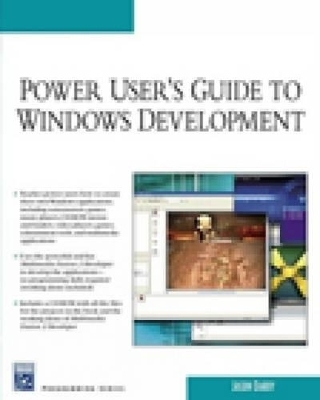
Power User's Guide to Windows Development
Charles River Media
978-1-58450-518-1 (ISBN)
- Titel ist leider vergriffen;
keine Neuauflage - Artikel merken
Microsoft Windows is the most popular operating system in the world. Millions of computers are shipped every year with it as the OS, making Windows the platform of choice for developers. And because of its widespread use, there are numerous programming languages that can be used to create applications that will work with Windows. But you don't have to be a programmer to develop practical, fun, and interesting applications with Windows. Many people have learned how to harness the power of Windows to make their own tools and the Power User's Guide to Windows Development will teach you how to create your own without knowing how to program! Written for power Windows users, Web developers, and beginning programmers who want to go beyond the basic functional uses of Windows, but who aren't programmers, this book is a complete guide to making your own games, music players, CD-ROM menus, screensavers, movie players, advertising materials, and more. Using a free trial version of Multimedia Fusion 2 Developer (Clickteam), you'll learn how to develop your own tools within Windows. A variety of fun projects are used throughout the book to get you developing practical applications quickly.
Beginning with basic screen savers, you'll progress through edutainment tools, interactive tutorials, games, CD-ROM menus, graphic creation, videos, music, and networking tools. So, if you want to make your own applications to use on Windows, the Power User's Guide to Windows Development will teach you everything you need to know-- no programming required!
CHAPTER 1 - WINDOWS DEVELOPMENT Why Make Programs? Program Types Screen Savers Edutainment Interactive Tutorials Games CDROM Menus Applications Software Tools Used Multimedia Fusion 2 Developer Chapter Summary CHAPTER 2 - INTRODUCTION TO DEVELOPER Product Range MMF vs MMF Developer Requirements Installation Requirements Runtime Requirements Installing Developer Chapter Summary CHAPTER 3 - GETTING TO KNOW DEVELOPER Program Creation Process in Developer Graphics & Design Objects Coding Program Walkthrough Editors The Editors Storyboard Editor Frame Editor Event Editor Event List Editor Picture Editor Expression Evaluator Properties Toolbars Chapter Summary CHAPTER 4 - OUR FIRST PROGRAM Setting up our screen Writing our Code Playback CHAPTER 5 - GRAPHICS AND ANIMATION Graphic Creation Importing Graphics Drawing Graphics in MMF2 Animations Image Objects Draw Object Picture Object Quick Backdrop Active Picture Active Backdrop Chapter Summary CHAPTER 6 - MOVEMENT Movement Basics Applying Movement Chapter Summary CHAPTER 7 SOUND AND MUSIC Using sound in your programs Adding Sound Adding Music Programming sound events Chapter Summary CHAPTER 8 - VIDEO Using Video Video Objects within MMF2 FLI Direct Show MCI AVI MPEG Quicktime Video Object Settings Inserting Video CHAPTER 9 - WINDOWS CONTROL Windows Standard Objects Buttons and Check boxes List Boxes Tool Bars Spin Object Combo Box Tree Control List View Datagrid Active System Box Background System Box Dialogue Object CHAPTER 10 - CURSORS Using Cursors Cursor Object Make Different Cursors CHAPTER 11 - TEXT Fonts and Text Placement Text Objects RTF Edit Box String Text Manipulation CHAPTER 12 - NETWORKING & OPERATING SYSTEMS Networking Operating Systems Moo FTP - File Transfer Protocol CHAPTER 13 - TIME AND DATE Timing Events The Clock and Countdown CHAPTER 14 - DATA ACCESS About Databases Database Objects INI Arrays ODBC PART 2 : PRACTICAL PROJECTS CHAPTER 15 - CREATING SCREENSAVERS What are Screensavers? Screensaver Types Pictures Movement Interactive Informative Windows Control Panel Creating a basic Screen saver Creating a preview screen Image Gallery saver Interactive Screensaver (using desktop background) Chapter Summary CHAPTER 16 - CREATING INTERACTIVE MENUS When are they used? Types Game/Program Loaders CDROM Navigation Installer Screen Menu Creation Example Using Autorun Chapter Summary CHAPTER 17 INTERACTIVE TUTORIAL Why Tutorials User Training Introduction to Product or Services Education Zoo Tutorial Project Graphics and Objects Zoo - Initial Set-up Creating the Frames Changing the Application Settings Zoo - Main Menu Zoo - Main Screens Zoo - Video Chapter Summary CHAPTER 18 CREATING A GAME Why Make Games Game Types Side Scrolling Platform Bat and Ball Card or Puzzle About the Game Graphics Library - The Game The Game - Initial Set-up Creating the Frames Changing Application Settings The Game - Main Menu The Game - The Game Screen The Game - Hi-Scores The Game - Programming Programming The Main Menu Programming The Game Programming The Hi-Scores Chapter Summary CHAPTER 19 CREATING AN APPLICATION Different Types of Application Window Types Full Screen Shaped Application Window MDI Functionality Task Bars Pop-up Menus Menus Icons Enabling and Disabling Windows Options Chapter Summary CHAPTER 20 - EDUCATION PROGRAM Education Types Education Example Chapter Summary CHAPTER 21 - VIDEO PLAYER Introduction Initial Set-up Programming Chapter Summary CHAPTER 22 - MUSIC PLAYER Introduction Initial Set-up Programming Chapter Summary CHAPTER 23 GETTING HELP MMF2 Help Help Files Help About Tutorial Examples Auto Update Backing up Files Useful Websites Other Sites Chapter Summary ABOUT THE CDROM APPENDIX
| Erscheint lt. Verlag | 2.5.2007 |
|---|---|
| Zusatzinfo | Illustrations |
| Verlagsort | Hingham |
| Sprache | englisch |
| Maße | 185 x 231 mm |
| Gewicht | 998 g |
| Themenwelt | Informatik ► Betriebssysteme / Server ► Windows |
| ISBN-10 | 1-58450-518-4 / 1584505184 |
| ISBN-13 | 978-1-58450-518-1 / 9781584505181 |
| Zustand | Neuware |
| Haben Sie eine Frage zum Produkt? |